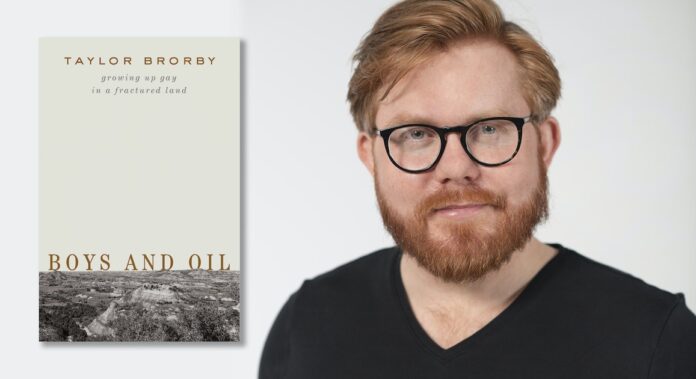
The prairie taught Taylor Brorby to see nuance. The prairie reveals.
Brorby suggests we visit his home state of North Dakota, preferably over the golden hour in November, when “the sky fires fuchsia and it smolders into orange, and then as it deepens, it goes into indigo, and wheat fields all of a sudden look like you’re in a wash of amber,” he tells me. “People like filters on Instagram. But I’m like, no [bleeping] filter on Instagram has done what my home has done!”
The writer and environmentalist speaks of the land that reared him from a place of love. But it’s a complicated love, forged by the goodness of grandparents as well as the harshness of hate. His new memoir, “Boys and Oil: Growing Up Gay in a Fractured Land,” is winning accolades from publications like the New York Times, particularly for his depiction of a kind of rural America that crushes its most vulnerable inhabitants.
Brorby, 34, says it’s important for him to share his story — a true one, in which the gay kid stays alive.
“If you were to say, ‘Name a famous piece of LGBTQ literature from the American West, everyone would say, ‘Brokeback Mountain.’ And then after that there’d be a long silence,” Brorby says. “There’s not a lot of nonfiction writing from that part of the world. No wonder why people feel so alone.”
Brorby remembers feeling the heft of that loneliness in the eighth grade, when he made a list of reasons to live, and a list of reasons to die. Being gay was one of the reasons to die. He grew up in a place called Center, N.D., “a place where people only end up,” as he writes in the first few pages. Kids in town called him gay slurs before he even knew what being gay meant.
“Boys and Oil” is the book he wishes he had back then. It’s not just for the 12-year-old gay boy growing up in a small town, he says, but for the 12-year-old straight boy who’s also living there — and who yearns to take oil painting lessons, but whose father dreams of him being the football star. He believes children “largely bend toward softness,” even joking that every 4-year-old boy “sounds gay when he’s around flowers.”
But after puberty, boys who read, paint or play music can raise suspicions in hometowns like his.
He calls North Dakota a “plundered region” where its coal, corn, soybeans, and even its people can be extracted. “My God, if people saw the prairie the way I saw it, it wouldn’t be getting destroyed.”
Seeing the world in color
In his book, Brorby recounts his move to Minnesota when he began his undergraduate studies at St. Olaf College. It was as if his world went from black and white to color. He realized he wasn’t the only one who was gay. He also was introduced to male professors who defied his concept of masculinity, grown men who earned their living by talking about the beauty of sentences. Although Brorby felt out of his depth, college cracked him open to new ways of thinking.
When he was 22, his aunt outed him to his parents, expressing concern that he was gay. He didn’t deny it. “When I said the shortest, most life-changing sentence you can say — ‘I am gay’ — my world got, as the Fresh Prince of Bel-Air would say, flipped-turned upside down,” he tells me.
He says his book blasts the myth that all parents love their children unconditionally. He hasn’t spoken to his in five years, though he says they were the picture of doting, supportive parents until they learned of his truth.
But his grandfathers — both men of the Greatest Generation — “were rock stars,” he says. He came out to his mother’s father, a Catholic, on Veterans Day at a Denny’s in Bismarck.
“He said, ‘Taylor, the priests tell us it’s against our religion. But you’re my grandson. Screw what the priests say,’ ” Brorby says. “It was that easy, Laura. And then he was like, ‘Try some of these pumpkin pancakes. They’re fabulous.’ “
When I speak to him by phone, Brorby is drinking coffee overlooking Lake Superior from Fitger’s Inn in Duluth. He’s in the middle of a book tour across Minnesota, still marveling that a kid from a trailer house in a town with no stoplight could write words that would attract lines of people who see the universal in his story. He notes that loneliness is not an urban vs. rural thing, nor is being a first-generation college student. The complexity of the American family can be found on any landscape.
When I ask him about coordinated efforts to ban books in schools and libraries, the gregarious Brorby sighs and collects his thoughts for nearly 10 silent seconds.
“It certainly comes from a mind-set of fear. It must also come from wanting to live in a world of black and white, and not nuance,” he says finally. “The hard thing about books is that they tell us we have options. Even if we believe we don’t.”
Brorby’s book might be a letter to kids like him, who’ve plotted out the pros and cons of continuing to live on this planet. He says at its heart is a message that simply says: Please stay.
If you go
Brorby will speak at a book-signing Thursday in Briggs Library at the University of Minnesota-Morris.







